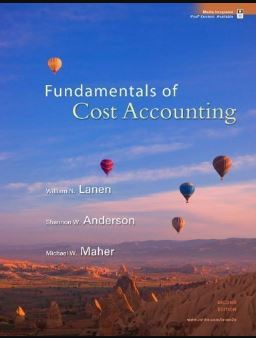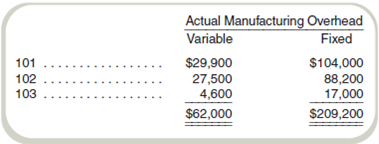
Fundamentals of Cost Accounting 2nd Edition by William Lanen, Carolyn Wells, Michael Maher
Edition 2ISBN: 978-0077274993
Fundamentals of Cost Accounting 2nd Edition by William Lanen, Carolyn Wells, Michael Maher
Edition 2ISBN: 978-0077274993 Exercise 34
Cost Flows through Accounts
Brighton Services repairs locomotive engines. It employs 100 full-time workers at $20 per hour. Since beginning operations last year, it has priced the various jobs by marking up direct labor and direct material costs 20 percent. Despite operating at capacity, however, last year's performance was a great disappointment to the managers. In total, 10 jobs were accepted and completed, incurring the following total costs:

Of the $1,040,000 manufacturing overhead, 30 percent was variable overhead and 70 percent was fixed.
This year Brighton Services expects to operate at the same activity level as last year, and overhead costs and the wage rate are not expected to change. For the first quarter of this year, Brighton Services completed two jobs and was beginning the third. The costs incurred follow:

You are a consultant associated with Lodi Consultants, which Brighton Services has asked for help. Lodi's senior partner has examined Brighton Services's accounts and has decided to divide actual factory overhead by job into fixed and variable portions as follows:

In the first quarter of this year, 40 percent of marketing and administrative cost was variable and 60 percent was fixed. You are told that jobs 101 and 102 were sold for $850,000 and $550,000, respectively. All over- or underapplied overhead for the quarter is written off to Cost of Goods Sold.
Required
a. Present in T-accounts the actual manufacturing cost flows for the three jobs in the first quarter of this year.
b. Using last year's overhead costs and direct labor-hours as this year's estimate, calculate predetermined overhead rates per direct labor-hour for variable and fixed overhead.
c. Present in T-accounts the normal manufacturing cost flows for the three jobs in the first quarter of this year. Use the overhead rates derived in requirement ( b ).
d. Prepare income statements for the first quarter of this year under the following costing systems:
(1) Actual.
(2) Normal.
Brighton Services repairs locomotive engines. It employs 100 full-time workers at $20 per hour. Since beginning operations last year, it has priced the various jobs by marking up direct labor and direct material costs 20 percent. Despite operating at capacity, however, last year's performance was a great disappointment to the managers. In total, 10 jobs were accepted and completed, incurring the following total costs:

Of the $1,040,000 manufacturing overhead, 30 percent was variable overhead and 70 percent was fixed.
This year Brighton Services expects to operate at the same activity level as last year, and overhead costs and the wage rate are not expected to change. For the first quarter of this year, Brighton Services completed two jobs and was beginning the third. The costs incurred follow:

You are a consultant associated with Lodi Consultants, which Brighton Services has asked for help. Lodi's senior partner has examined Brighton Services's accounts and has decided to divide actual factory overhead by job into fixed and variable portions as follows:

In the first quarter of this year, 40 percent of marketing and administrative cost was variable and 60 percent was fixed. You are told that jobs 101 and 102 were sold for $850,000 and $550,000, respectively. All over- or underapplied overhead for the quarter is written off to Cost of Goods Sold.
Required
a. Present in T-accounts the actual manufacturing cost flows for the three jobs in the first quarter of this year.
b. Using last year's overhead costs and direct labor-hours as this year's estimate, calculate predetermined overhead rates per direct labor-hour for variable and fixed overhead.
c. Present in T-accounts the normal manufacturing cost flows for the three jobs in the first quarter of this year. Use the overhead rates derived in requirement ( b ).
d. Prepare income statements for the first quarter of this year under the following costing systems:
(1) Actual.
(2) Normal.
Explanation
a.
T accounts:
In The material inventor...
Fundamentals of Cost Accounting 2nd Edition by William Lanen, Carolyn Wells, Michael Maher
Why don’t you like this exercise?
Other Minimum 8 character and maximum 255 character
Character 255


